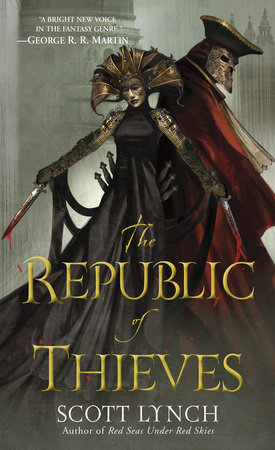Excerpt
Red Seas Under Red Skies
CHAPTER ONELITTLE GAMES1THE GAME WAS CAROUSEL HAZARD, the stakes were roughly half of all the wealth they commanded in the entire world, and the plain truth was that Locke Lamora and Jean Tannen were getting beaten like a pair of dusty carpets.
"Last offering for the fifth hand," said the velvet-coated attendant from his podium on the other side of the circular table. "Do the gentlemen choose to receive new cards?"
"No, no—the gentlemen choose to confer," said Locke, leaning to his left to place his mouth close to Jean's ear. He lowered his voice to a whisper. "What's your hand look like?"
"A parched desert," Jean murmured, casually moving his right hand up to cover his mouth. "How's yours?"
"A wasteland of bitter frustration."
"Shit."
"Have we been neglecting our prayers this week? Did one of us fart in a temple or something?"
"I thought the expectation of losing was all part of the plan."
"It is. I just expected we'd be able to put up a better fight than
this."
The attendant coughed demurely into his left hand, the card-table equivalent of slapping Locke and Jean across the backs of their heads. Locke leaned away from Jean, tapped his cards lightly against the lacquered surface of the table, and grinned the best knew-what-he-was-doing sort of grin he could conjure from his facial arsenal. He sighed inwardly, glancing at the sizable pile of wooden markers that was about to make the short journey from the center of the table to his opponents' stacks.
"We are of course prepared," he said, "to meet our fate with heroic stoicism, worthy of mention by historians and poets."
The dealer nodded. "Ladies and gentlemen both decline last offering. House calls for final hands."
There was a flurry of shuffling and discarding as the four players formed their final hands and set them, facedown, on the table before them.
"Very well," said the attendant. "Turn and reveal."
The sixty or seventy of Tal Verrar's wealthiest idlers who had crowded the room behind them to watch every turn of Locke and Jean's unfolding humiliation now leaned forward as one, eager to see how embarrassed they would be this time.
2TAL VERRAR, the Rose of the Gods, at the westernmost edge of what the Therin people call the civilized world.
If you could stand in thin air a thousand yards above Tal Verrar's tallest towers, or float in lazy circles there like the nations of gulls that infest the city's crevices and rooftops, you could see how its vast dark islands have given this place its ancient nickname. They seem to whirl outward from the city's heart, a series of crescents steadily increasing in size, like the stylized petals of a rose in an artist's mosaic.
They are not natural, in the sense that the mainland looming a few miles to the northeast is natural. The mainland cracks before wind and weather, showing its age. The islands of Tal Verrar are unweathered, possibly unweatherable—they are the black glass of the Eldren, unimaginable quantities of it, endlessly tiered and shot through with passages, glazed with layers of stone and dirt from which a city of men and women springs.
This Rose of the Gods is surrounded by an artificial reef, a broken circle three miles in diameter, shadows under shadowed waves. Against this hidden wall the restless Sea of Brass is gentled for the passage of vessels flying the banners of a hundred kingdoms and dominions. Their masts and yards rise in a forest, white with furled sails, far beneath your feet.
If you could turn your eye to the city's western island, you would see that its interior surfaces are sheer black walls, plunging hundreds of feet to the softly lapping harbor waves, where a network of wooden docks clings to the base of the cliffs. The seaward side of the island, however, is tiered along its entire length. Six wide, flat ledges sit one atop the other with smooth fifty-foot escarpments backing all but the highest.
The southernmost district of this island is called the Golden Steps—its six levels are thick with alehouses, dicing dens, private clubs, brothels, and fighting pits. The Golden Steps are heralded as the gambling capital of the Therin city-states, a place where men and women may lose money on anything from the mildest vices to the wickedest felonies. The authorities of Tal Verrar, in a magnanimous gesture of hospitality, have decreed that no foreigner upon the Golden Steps may be impressed into slavery. As a result, there are few places west of Camorr where it is safer for strangers to drink their brains out and fall asleep in the gutters and gardens.
There is rigid stratification on the Golden Steps; with each successively higher tier, the quality of the establishments rises, as do the size, number, and vehemence of the guards at the doors. Crowning the Golden Steps are a dozen baroque mansions of old stone and witchwood, embedded in the wet green luxury of manicured gardens and miniature forests.
These are the "chance houses of quality"—exclusive clubs where men and women of funds may gamble in the style to which their letters of credit entitle them. These houses have been informal centers of power for centuries, where nobles, bureaucrats, merchants, ships' captains, legates, and spies gather to wager fortunes, both personal and political.
Every possible amenity is contained within these houses. Notable visitors board carriage-boxes at exclusive docks at the base of the inner harbor cliffs, and are hauled up by gleaming brass water engines, thereby avoiding the narrow, twisting, crowd-choked ramps leading up the five lower Steps on their seaward face. There is even a public dueling green—a broad expanse of well-kept grass lying dead-center on the top tier, so that cooler heads need not be given any chance to prevail when someone has their blood up.
The houses of quality are sacrosanct. Custom older and firmer than law forbids soldiers or constables to set foot within them, save for response to the most heinous crimes. They are the envy of a continent: no foreign club, however luxurious or exclusive, can quite recapture the particular atmosphere of a genuine Verrari chance house. And they are, one and all, put to shame by the Sinspire.
Nearly one hundred and fifty feet tall, the Sinspire juts skyward at the southern end of the topmost tier of the Steps, which is itself more than two hundred and fifty feet above the harbor. The Sinspire is an Elderglass tower, glimmering with a pearly black sheen. A wide balcony decked with alchemical lanterns circles each of its nine levels. At night, the Sinspire is a constellation of lights in scarlet and twilight-sky blue, the heraldic colors of Tal Verrar.
The Sinspire is the most exclusive, most notorious, and most heavily guarded chance house in the world, open from sunset to sunrise for those powerful, wealthy, or beautiful enough to make it past the whims of the doorkeepers. Each ascending floor outdoes the one beneath it for luxury, exclusivity, and the risk ceiling of the games allowed. Access to each higher floor must be earned with good credit, amusing behavior, and impeccable play. Some aspirants spend years of their lives and thousands of solari trying to catch the attention of the Sinspire's master, whose ruthless hold on his unique position has made him the most powerful arbiter of social favor in the city's history.
The code of conduct at the Sinspire is unwritten, but as rigid as that of a religious cult. Most simply, most incontrovertibly, it is death to be caught cheating here. Were the archon of Tal Verrar himself to be detected with a card up his sleeve, he would find no appeal this side of the gods themselves from the consequences. Every few months, the tower's attendants discover some would-be exception to the rule, and yet another person dies quietly of an alchemical overdose in their carriage, or tragically "slips" from the balcony nine stories above the hard, flat stones of the Sinspire's courtyard.
It has taken Locke Lamora and Jean Tannen two years and a completely new set of false identities to carefully cheat their way up to the fifth floor.
They are, in fact, cheating at this very moment, trying hard to keep up with opponents who have no need to do likewise.
3"LADIES SHOW a run of Spires and a run of Sabers, crowned with the Sigil of the Sun," said the attendant. "Gentlemen show a run of Chalices and a mixed hand, crowned with the five of Chalices. Fifth hand is to the ladies."
Locke bit the inside of his cheek as a wave of applause rippled through the warm air of the room. The ladies had taken four of the five hands so far, and the crowd had barely deigned to notice Locke and Jean's sole victory.
"Well, damn," said Jean, in credible mock surprise.
Locke turned to the opponent on his right. Maracosa Durenna was a slender, dark-complexioned woman in her late thirties, with thick hair the color of oil smoke and several visible scars on her neck and forearms. In her right hand she held a thin black cigar wrapped with gold thread, and on her face she wore a tight smile of detached contentment. The game was clearly not demanding her utmost exertion.
The attendant flicked Locke and Jean's little pile of lost wooden counters toward the ladies' side of the table with a long-handled crop. He then used the same crop to sweep all the cards back into his hands; it was strictly forbidden for players to touch the cards after the attendant had called for the reveal.
"Well, Madam Durenna," said Locke, "my congratulations on the increasingly robust state of your finances. Your purse would seem to be the only thing growing faster than my impending hangover." Locke knuckle-walked one of his markers over the fingers of his right hand. The little wooden disk was worth five solari, roughly eight months' pay for a common laborer.
"My condolences on a particularly unfortunate run of cards, Master Kosta." Madam Durenna took a long drag from her cigar, then slowly exhaled a stream of smoke so that it hung in the air between Locke and Jean, just far enough away to avoid direct insult. Locke had come to recognize that she used the cigar smoke as her
strat pé
ti, her "little game"—an ostensibly civilized mannerism actually cultivated to distract or annoy opponents at a gaming table, and goad them into mistakes. Jean had planned to use his own cigars for the same purpose, but Durenna's aim was better.
"No run of cards could be considered truly unfortunate in the presence of such a lovely pair of opponents," said Locke.
"I could almost admire a man who can stay so charmingly dishonest while being bled of all his silver," said Durenna's partner, who was seated on Durenna's right, between her and the dealer.
Izmila Corvaleur was nearly of a size with Jean, wide and florid, prodigiously rounded in every place a woman
could be round. She was undeniably attractive, but the intelligence that shone out of her eyes was sharp and contemptuous. In her Locke recognized a contained pugnacity akin to that of a street brawler—a honed appetite for hard contests. Corvaleur nibbled constantly from a silver-gilded box of cherries coated in powdered chocolate, sucking her fingers loudly after each one. Her own
strat pé
ti, of course.
She was purpose-built for Carousel Hazard, thought Locke. A mind for the cards and a frame capable of withstanding the game's unique punishment for losing a hand.
"Default," said the attendant. Within his podium, he tripped the mechanism that set the carousel spinning. This device, in the center of the table, was a set of circular brass frames that held row upon row of tiny glass vials, each one capped in silver. It whirled under the soft lantern light of the gaming parlor, until it became continuous streaks of silver within brass, and then—a clinking sound of mechanisms beneath the table, the rattle of many tiny vessels of thick glass colliding with one another, and the carousel spat out two of its vials. They rolled toward Locke and Jean and clattered against the slightly upraised outer rim of the table.
Carousel Hazard was a game for two teams of two; an
expensive game, for the clockwork carousel mechanism came very dear. At the end of each hand, the losing team was randomly dispensed two vials from the carousel's great store of little bottles; these held liquor, mixed with sweet oils and fruit juice to disguise the potency of any given drink. The cards were only one aspect of the game. Players also had to maintain concentration under the increasing effects of the devilish little vials. The only way a game could end was for a player to become too drunk to keep playing.
Theoretically, the game could not be cheated. The Sinspire maintained the mechanism and prepared the vials; the little silver caps were fastened tight over wax seals. Players were not permitted to touch the carousel, or another player's vials, on pain of immediate default. Even the chocolates and cigars being consumed by the players had to be provided by the house. Locke and Jean could even have refused to allow Madam Corvaleur the luxury of her sweets, but that would have been a bad idea for several reasons.
"Well," said Jean as he cracked the seal on his tiny libation, "here's to charming losers, I suppose."
"If only we knew where to find some," said Locke, and in unison they tossed back their drinks. Locke's left a warm, plum-flavored trail down his throat—it was one of the potent ones. He sighed and set the empty vial down before him. Four vials to one, and the way his concentration seemed to be unraveling at the edges meant that he was beginning to feel it.
As the attendant sorted and shuffled the cards for the next hand, Madam Durenna took another long, satisfied draw on her cigar and flicked the ashes into a solid-gold pot set on a pedestal behind her right hand. She exhaled two lazy streams of smoke through her nose and stared at the carousel from behind a gray veil. Durenna was a natural ambush predator, Locke thought, always most comfortable behind some camouflage. His information said that she was only recently arrived in the life of a city-bound merchant speculator. Her previous profession had been the command of bounty-privateers, hunting and sinking the slaver ships of Jerem on the high seas. She hadn't acquired those scars drinking tea in anyone's parlor.
It would be very, very unfortunate if a woman like her were to realize that Locke and Jean were counting on what Locke liked to call "discreetly unorthodox methods" to win the game—hell, it would be preferable to simply lose the old-fashioned way, or to be caught cheating by the Sinspire attendants. They, at least, would probably be quick and efficient executioners. They had a very busy establishment to run.








